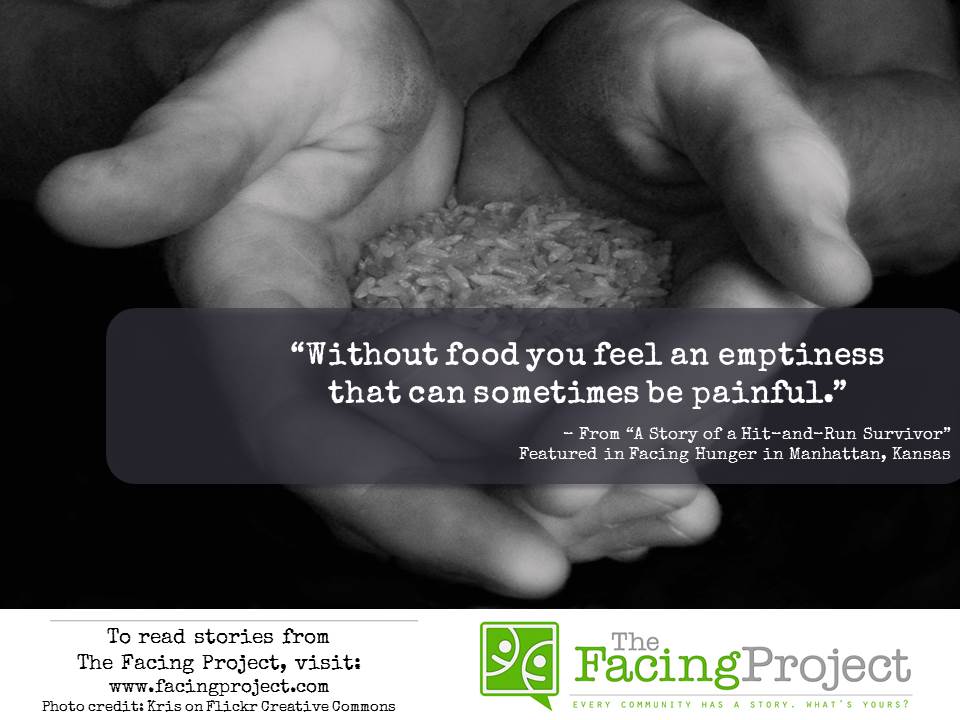On Black Friday I fasted for the first time. After years of consuming the chewy saltiness of leftover turkey and stuffing, this time around I chose not to eat at all.
Now, most people associate fasting with religion, but this was not the basis of my fast. I decided to fast in solidarity with my good friend and co-founder of The Facing Project Kelsey Timmerman–who has fasted the past couple of Black Fridays in protest of over consumerism. This year, Kelsey asked me if I would fast with him, and after a quick check of my calendar I said: “Sure, I seem to be free.”
Twenty-one hours of not eating didn’t seem too hard.
At first I wasn’t certain why I had agreed to this since over-consumerism isn’t necessarily my platform; though it is something I agree is an issue. But it wasn’t hard to find a reason to fast and to reflect; I only had to look as far as our own organization. Over the past year, Facing Projects across the country have collected narratives of those who face hunger, homelessness, and poverty. I decided to honor those stories.
I ate my last meal at 9:00 p.m. on the night of Thanksgiving.
The next morning, 12 hours into my fast, I was hangry—the overwhelming feeling of being hungry and angry at the same time. Overall, frustrated that I couldn’t—that I had chosen not to—eat. The most trying part of all was that my cabinets were full of food, gently calling my name.
Peanut butter, waiting for me to spread him across warm toast and sprinkle him with the stickiness of honey. Cheerios whispering, “We need milk, please.”
But I didn’t submit.
As the day wore on it wasn’t the hanger getting to me, but the headache and deep pit of emptiness that were hard to ignore. I started to realize the friend I had in food. Food has always been there to comfort and greet me when I’m sad and when I’m happy; food finds a way to keep me company when I’m bored. The temptation calling from the cabinets was impossible to bear, so to take my mind off of food and pass time I cleaned and put up the Christmas tree.
At 2:30 in the afternoon, Kelsey texted to see if I wanted to break our 21-hour fast at 6:00 p.m. at a Muncie favorite—and, of course, an old friend—Pizza King.
As we nibbled on the last piece of the pizza and made plans for hot chocolate, I daydreamed about what else I would eat later that night. A sense of guilt set in because I knew how full my cupboards were, and how for many hunger is not done from the privilege of choosing not to eat for reflection or protest—and after 21 hours, hunger for many doesn’t subside.
Though I was able to eat at the set time established to break our fast, I still experienced, for a moment, the emptiness—literally and metaphorically—that exists when one goes without a meal. And the solidarity with Kelsey, and those who’ve shared their stories of hunger, went deeper than pen diving into paper; beyond story—to a place of understanding. But I don’t face hunger on a regular basis, and that’s the biggest lesson I learned. I will appreciate food more from here on out.
***
The hunger I experienced and the hunger we face in our daily lives pales in comparison to those who don’t have access to food. Their stories are the ones we can really learn what it means to truly be hungry. This week’s Featured Story is one such narrative. Left broken after an accident, “The Story of a Hit-and-Run Survivor” from Facing Hunger in Manhattan, Kansas, explores the struggles of being a mother and a provider when food isn’t always plenty.


